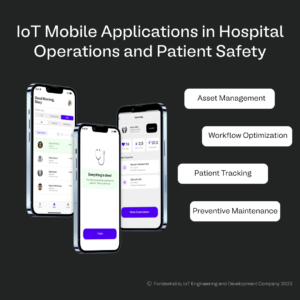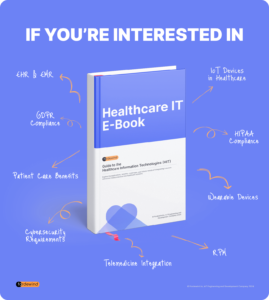IoT Mobile Applications

IoT-based mobile applications have become a game-changer for the healthcare industry. These applications are being used to enhance patient safety, improve hospital operations, and reduce healthcare costs.
Speaking of hospital operations, IoT-based mobile applications can streamline various hospital operations, including Asset Management, Workflow Optimization, Patient Tracking, and Preventive Maintenance.

- Asset Management: Hospitals have a vast array of assets, including medical equipment, furniture, and supplies. IoT-based mobile applications can help hospitals manage these assets effectively. With IoT sensors attached to each asset, hospitals can track their location, usage, and maintenance schedules.
- Workflow Optimization: IoT-based mobile applications can help hospitals optimize their workflows. For example, an application can be used to track the location of staff members, assign tasks to them, and receive real-time updates on their progress.
- Patient Tracking: Hospitals can use IoT-based mobile applications to track patients’ movement throughout the facility. This information can be used to optimize hospital workflows, reduce wait times, and improve patient satisfaction.
- Preventive Maintenance: IoT sensors can be used to detect potential issues with hospital equipment before they become major problems. IoT-based mobile applications can alert maintenance staff to these issues, allowing them to take preventive measures.
Besides Hospital Operations, IoT-based mobile applications can also improve patient safety in several ways:
- Medication Management: Medication errors are a significant cause of patient harm. IoT-based mobile applications can help prevent medication errors by providing nurses and physicians with real-time medication information and reminders.
- Fall Prevention: Falls are a significant cause of patient injury in hospitals. IoT-based mobile applications can help prevent falls by tracking patients’ movements and sending alerts to staff members when patients are at risk of falling.
- Infection Control: Hospitals are prone to outbreaks of infectious diseases. IoT-based mobile applications can help prevent the spread of infections by monitoring hospital hygiene, tracking the movement of staff and patients, and alerting staff members to potential sources of contamination.
- Patient Monitoring: IoT-based mobile applications can provide real-time monitoring of patients’ vital signs, alerting staff members to potential issues before they become major problems.
Consequently, IoT-based mobile applications are transforming hospital operations and improving patient safety. These applications can streamline hospital workflows, improve asset management, and prevent equipment failure. They can also prevent medication errors, falls, and the spread of infections. As hospitals continue to embrace IoT-based mobile applications, we can expect to see significant improvements in patient outcomes, hospital efficiency, and healthcare costs.
Fordewind.io is an IoT engineering and development company based in Kyiv, Ukraine. Our main areas of interest and expertise are the automotive industry and Smart Home/City projects. Contact us right now without a doubt and learn more about how we can help you build the future.
